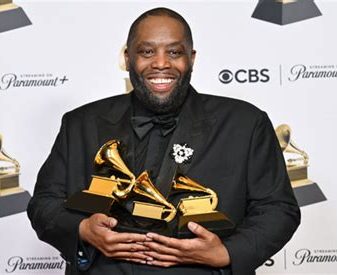Every year the Grammy Awards seems to spark some form of controversy. Whether it’s the recipient of the Album of the Year Award who some feel didn’t deserve it, or even the lack of a nomination in the first place, somebody somewhere will be voicing their disagreement.
However, at this year’s 66th Annual Grammy Awards, most of the discourse was focused on one artist: Killer Mike. That name might not sound familiar to most people, and that is exactly the source of the controversy.
Despite being nominated alongside the biggest rappers of the current day such as Travis Scott and Drake, and generational Hip-Hop legends such as Nas, 48-year-old rapper Killer Mike swept the Hip-Hop categories with three awards, including Best Rap Song, Best Rap Performance, and the highest honor of the genre: Best Rap Album. These awards completely took the Hip-Hop world by surprise and sparked many conversations about mainstream music awards.
There were many arguments from both sides of the situation, those who felt that Killer Mike deserved the awards he received, and those who believed he did not. Those who believe the awards were deserved cite Mike’s two decades in the music industry, working alongside legendary Hip-Hop Artists such as Andre 3000 and Big Boi of Outkast, Jay-Z, and Rapper/Producer El-P whom with Mike formed the acclaimed Hip-Hop duo Run the Jewels, as reason for him receiving these awards. His critics, however, cite his lack of prominence on the music charts and relevance with young people compared to his fellow nominees.
Killer Mike, who was born in Atlanta as Michael Render, released his first solo album in over a decade last year, entitled, “Michael,” a deeply personal record that Render calls his “come home moment musically” in an interview with New Zealand DJ Zane Lowe. The album has a classic Hip-Hop sound, with heavy influence from gospel, funk, and soul with lyrics that touch on topics such as religion, success, and the African American experience. The cover art features a school photo of Render as a child wearing both devil horns and an angel’s halo. It stands out amongst most of its fellow nominees for Best Rap Album, with Travis Scott’s “Utopia” experimenting with production and attempting to evolve the genre, or Drake and 21 Savage’s “Her Loss” which is very pop-oriented, “Michael” brings a more standard Hip-Hop sound with a heavy emphasis on lyrical content.
Killer Mike shocked the Hip-Hop world on February 4th when he took home not one, but three Grammy awards in the rap category, immediately sparking conversation. For most of America, the response to Render’s Grammy sweep was one word: “Who?”
It is no secret that amongst his fellow nominees, Killer Mike was the most unknown to the public, but to the hardcore fans of Hip-Hop, this night was a long time coming. With over twenty years in the industry, Render has built himself an incredibly respectable image for his artistry and activism, making music that focuses on lyrical content and message. When it comes to billboard hits and media attention, artists like Drake and Travis Scott dominate, being some of the most popular musicians with young people today. The internet was subsequently flooded with posts asking “who is Killer Mike?” questioning just how he could have possibly beat out the more mainstream acts.
This began a conversation about the state of the Grammys as people started to debate what is the point of the awards. If the award for Best Rap Album is meant to go to the person with the ‘best’ rap album, how is that determined? Should mainstream popularity play a role, or is that irrelevant to the actual art that is being produced? Artists like Travis Scott and Drake constantly sell out world tours and have dozens of platinum singles, but quite often lose to the more lyrically and message-driven artists once award season comes around. It becomes clear that there is a disparity between the members of the recording academy and the mainstream public in what they value in music.
In a poll made for this story, people were asked what they value the most when it comes to listening to music. The three options were: Instrumentation/Vibe, Lyrics/Messaging, or a third option for those who prefer both equally. At the end of the poll, the results showed that 54% of those who answered said that they value the instrumentals and vibe of songs more than anything else. 40% of those who answered said they value both instrumentals and lyrics equally when listening to music, and just 6% of people said that they value the lyrics and message of a song above anything else. This poll demonstrated that people have varying values when it comes to how they perceive music, showing that there is no correct way to interpret a song and not everyone appreciates the same things.
This leads into an even broader conversation when it comes to the judging of art in general. There are multiple big awards besides the Grammys every year with The Oscars, The Emmys, The Tonys, SAGA, and many more that all attempt to determine the “best” in entertainment and art, and every year there are droves of people claiming the wrong choice was made. The truth is, there is no world where everyone is satisfied because different people value different things when it comes to art, because after all, as the famous saying goes, art is indeed subjective.
So why do these award shows even matter? Why are the Oscars and Grammy more important than, say, the MTV Music Awards, or Teen Choice Awards? Well, they’re not, the public has just been told that they matter more. The argument could be made that the Oscars and Grammys have academies filled with the best in their respective fields who are the most qualified to judge these awards, but does that matter?
Art is meant to be experienced by everyone, no matter their experiences in a certain field or knowledge of how it is made. Every single day, regular ordinary people visit art museums, watch movies, and listen to music, all using their own experiences to inform what they are seeing and/or hearing. To have a handful of academy members then decide what is deemed the “best” is essentially speaking in place of other people’s experiences. Art differs from other aspects of society, such as science or sports, as it has no real metrics from which to judge, meaning all analysis is based entirely on personal experience and how that informs their judgment.
As these realizations about music are brought up, the validity of the Grammys and other award shows begins to shrink. Every year, there are more and more artists voicing their opinion about the Grammys, citing favoritism within the academy and lack of acknowledgement of popular musicians. All that a Grammy is these days is an ego boost and a right to brag for artists, and people are beginning to see that. Only time will tell us what the future of music awards will be, but it is fair to say the prominence of the Grammy awards may only fall from here.













